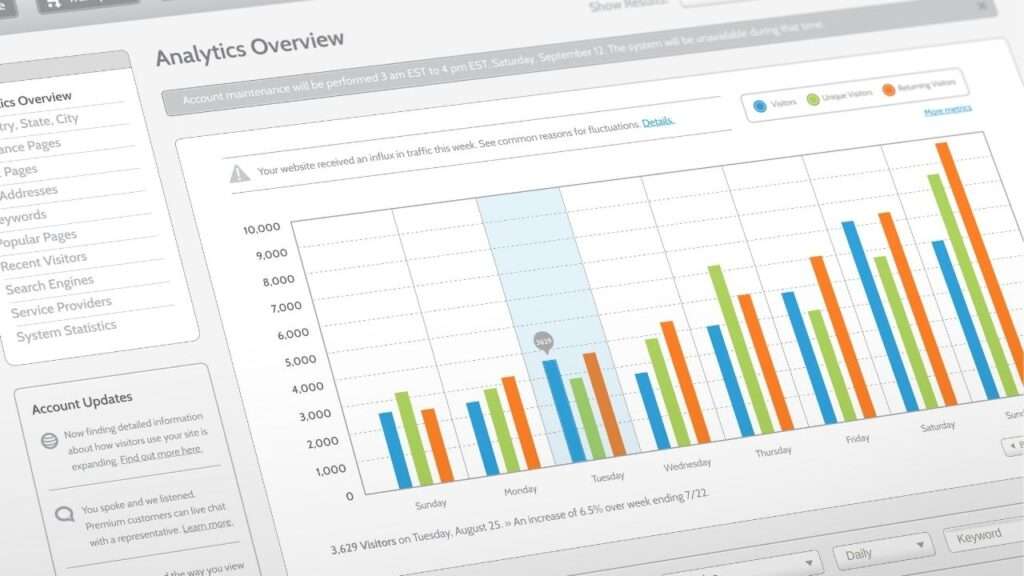
Struggling to know which tool better measures your website’s success? Google Search Console vs Google Analytics often report different numbers for clicks, sessions, and keywords. This disparity can frustrate marketers aiming to optimize search traffic and organic search performance. Google Search Console focuses on organic search traffic, search visibility, and search queries before users click your site. Google Analytics focuses on user behavior and post-click interactions, such as conversions and session duration.
Accordingly, the complete guide below explains integration steps, comparison of search console data versus analytics data, and actionable insights from Google Analytics 4 combined with Search Console. You’ll learn how to use Google Search Console and Google Analytics together effectively to improve search engine optimization and enhance user experience.
What is Google Analytics?
Google Analytics is a powerful analytics platform that allows you to collect data on website user behavior. This tool focuses on user behavior and traffic data rather than search engine results pages performance. It helps businesses track how visitors interact with their content, which pages perform well, and where users drop off. Google Analytics tracks data on bounce rates, session durations, and real-time active users, making it highly effective for behavioral analysis and insights.
Google Analytics 4 (GA4), the latest version, emphasizes cross-device tracking and data collection across multiple platforms. This version also provides data on app and web activity simultaneously. Analytics provides detailed visual dashboards that help decode trends and patterns over time. Unlike tools like Google Search Console, Google Analytics focuses on user behavior after a visitor arrives on your site. Analytics data becomes crucial when businesses aim to improve user experience and conversion paths.
What is Google Search Console?
Google Search Console provides data directly from Google’s index to help you assess search performance and visibility. This tool focuses specifically on Google search results and how your site performs in search results. It allows you to view clicks, impressions, and search queries users used to find your pages. Search console tracks how well content ranks and shows which pages appear on search engine results pages.
Google Search Console offers insights into organic traffic, search ranking, and search visibility. It helps site owners monitor performance in Google Search and access data on search indexing and crawling. The platform also provides performance data such as click-through rates and average position. Additionally, you can use Google Search Console to identify and fix data validation errors and mobile usability issues.
Unlike Google Analytics, the search console provides SEO-specific insights based on data from Google Search rather than user interaction. Google Search Console helps users improve search engine optimization and organic reach by aligning content with what people search.
Similarities Between Google Search Console and Google Analytics

Website Traffic:
Both Google Search Console and Google Analytics provide data related to organic traffic and overall search traffic. While Google Analytics tracks user sessions, Search Console tracks the number of clicks from search engine results pages. Additionally, both tools collect data from visitors and reflect how your site performs in search results. Search console data includes impressions and click rates, whereas analytics provides deeper insights on bounce rates and session time. Google Search Console helps analyze search-based visits; analytics focuses on user behavior during those visits. Use Google tools together to see a full picture of traffic data. Although their focus differs, analytics and Google Search Console show how people find and interact with your site.
Page Performance:
Both platforms assess how individual pages perform in search results and among site visitors.
- Google Search Console provides data on impressions, average position, and total clicks per page.
- Google Analytics tracks bounce rates, average session duration, and user paths on a page.
- Search console focuses on SEO, helping understand where pages rank and how users find them.
- Analytics focuses on user behavior, such as actions taken after arriving at a page.
- Search Console offers a detailed performance report that pinpoints poorly performing URLs in search engine results pages.
Use both tools to assess what content attracts users and what needs refinement.
Traffic Sources:
Both Google Analytics and Google Search Console offer a lens into how users reach your site. Google Analytics focuses on multi-channel attribution, including direct, referral, and Google Ads sources. Meanwhile, search console data emphasizes organic search traffic from search engines like Google. Analytics and Google Search Console differ in scope, but both provide data on inbound paths. Search Console provides detailed information on search engine results pages traffic. Google Analytics vs Google Search Console mainly differ in how each platform defines source and medium. Nevertheless, combining both reveals key differences between Google Search and other acquisition channels. Altogether, using both platforms concurrently ensures a comprehensive overview of all traffic sources.
User Data:
Google Analytics focuses on user activity and analytics uses sessions, users, and events to create meaningful metrics. Search console data, while more SEO-centric, still contributes to user data through query clicks and page-level engagement. Google Analytics tracks how users behave once they arrive, including interactions and conversions. Google Search Console focuses on how users reach the site, mainly via organic search. Analytics platform segmentation allows detailed breakdowns by demographics and devices. Use Google Analytics for post-click data; use Google Search Console to measure visibility. Additionally, analytics and Google Search Console together help correlate keyword traffic with on-page behavior. Each tool gathers data from both tools but presents different user insights.
Tracking Goals:
Both tools enable goal-setting indirectly, albeit with different data collection and measurement criteria. Google Analytics offers event-based tracking goals, ideal for form submissions, purchases, or time-based interactions. Meanwhile, Search Console provides data on search ranking and performance report metrics that indicate success in organic search traffic. Use Google Search Console to verify if ranking improvements align with content goals. Conversely, analytics provides actionable insights into how visitors convert post-click. Google Analytics vs Google Search Console becomes significant when defining KPIs. Although Search Console offers fewer goal metrics, it supports SEO-based target tracking. Search Console and Google Analytics integration help create comprehensive conversion funnels and compare engagement against visibility.
Search Queries:
Google Search Console provides data on specific search queries that generate impressions and clicks. This helps SEO professionals measure keyword alignment and search engine optimization effectiveness.
- Search console to Google: Identify how people arrive from Google search results using precise queries.
- Search console tracks impressions, CTR, and average ranking for each search query.
- Google Search Console shows changes in search performance for newly optimized keywords.
- Use Google Search Console to refine content that matches high-performing queries.
- Google Search Console offers detailed visibility into what searchers type before visiting your site.
This data is not available within Google Analytics, making the console crucial for keyword strategies.
Differences Between Google Search Console vs Google Analytics

Metrics:
Google Analytics focuses on user interactions, including bounce rates, session durations, and pages per session metrics. Conversely, Google Search Console focuses on search visibility, search ranking, and search performance metrics. Google Analytics tracks user navigation, while Console tracks keyword impressions and organic search behavior. Search console data shows how a site performs in search, especially on search engine results pages. Meanwhile, analytics provides more detailed metrics on user behavior and conversion funnels. Use Google Analytics to assess campaign performance and use Google Search Console to optimize search traffic. Console vs Google Analytics 4 also differs in measurement models and data collection logic.
Use:
Google Search Console and Analytics have different purposes based on their data source and intended audience. Use Google Search Console to monitor how your website performs in Google search results using specific search queries. In contrast, use Google Analytics to understand what users do after landing on your site. Search Console offers insights for search engine optimization, while Google Analytics is a powerful analytics platform for behavioral analysis. Google Search Console to monitor crawling, indexing, and provides data for SEO adjustments. Conversely, analytics focuses on user behavior, funnel performance, and organic traffic patterns across devices and locations.
Verification:
Verifying ownership differs between Google Search Console vs Google Analytics, even though both offer data on search performance. Google Search Console accounts require site verification through DNS, HTML tag, or Google Tag Manager integration. Conversely, Google Analytics integrates seamlessly via embedded tracking codes and analytics platform setups. Analytics and Google Search Console can work together post-verification, but each must be validated independently. The console uses Pacific Daylight Time, which affects report synchronization unless properly aligned. Verification ensures secure access to search console data and analytics data, reducing data validation errors. Google to find verified access routes within each respective dashboard.
Error Information:
Google Search Console provides in-depth error alerts for technical SEO and indexing challenges.
- Search Console helps detect crawl issues, indexing failures, and sitemap validation errors.
- Google Search Console tracks mobile usability, Core Web Vitals, and HTTPS implementation errors.
- Use Google Search Console to identify structured data errors and broken internal links.
- Data validation errors and missing schema tags are shown clearly in the performance and enhancement tabs.
- Unlike Google Analytics, error reporting in the console relates specifically to search engines and search ranking performance.
Google Analytics and Search Console combined offer clearer insight into cause and effect.
Reporting Features:
Google Analytics vs Google Search Console differ sharply in how each platform presents performance data and reports. Google Analytics provides customizable dashboards and automated event tracking, especially useful for campaigns and e-commerce. Search Console offers performance reports related to search queries, impressions, and CTR data across multiple pages. Google Search Console data is segmented by devices, countries, and query terms. Conversely, Google Analytics tracks real-time traffic and user flow through funnels. Analytics uses visual tools like graphs and flowcharts, while Google Search Console shows tabulated reports focused on search visibility and keyword exposure. Search console, together with analytics, improves decision-making clarity.
Daily Limits:
Google Search Console and Analytics have different daily limits affecting data collection and export capabilities. Google Analytics 4 limits API queries and sampling thresholds for free users, especially with large datasets. Search Console to Google also has quota limits when connected to external tools like Data Studio. GSC data exports are limited to 1,000 rows via the interface but are extendable through APIs. Google Analytics tracks more dimensions per session, though heavy usage can trigger data validation errors. Search console uses Pacific Daylight Time, which can skew data alignment if not adjusted. Data from Google Search Console refreshes less frequently than analytics.
How Do Google Search Console and Google Analytics Work Together?
Google Search Console and Google Analytics work together by linking search performance data with user interaction metrics. Google Analytics focuses on behavioral insights, whereas Google Search Console focuses on visibility and organic search traffic from search engines. When integrated, these platforms collect data that reveals how users find a website and what they do afterward. Search Console provides data like search queries, impressions, and click volume from search engine results pages. Conversely, analytics tracks bounce rates, session durations, and navigation flow across the site.
Use Google Search Console to see how your site performs in Google search and use Google Analytics to assess on-site behavior. Google Analytics and Search Console together help marketers correlate search performance data with post-click activity. Console and Google Analytics together enhance insights by joining traffic data with search console data. Google Tag Manager can facilitate smooth integration for improved data collection and clearer SEO measurement.
Conclusion
Both Google Search Console and Google Analytics play essential, yet distinct roles in a robust SEO strategy. Search Console monitors search engine results pages, tracking visibility, ranking, and specific search queries. Meanwhile, Analytics analyzes what visitors do on your site, from traffic data to conversions. Together, they offer a unified view, from finding to engagement. This guide showcased how Google Analytics and Google Search Console complement each other to inform smarter decisions. Did this comparison help you decide which tool delivers better value for your goals?
FAQs
Do I need both Google Search Console and Google Analytics?
Yes, both tools serve different purposes and together provide a complete view of your website’s performance.
Which tool is better for SEO monitoring?
Google Search Console focuses specifically on SEO, tracking search queries, rankings, and crawl issues.
Can Search Console replace Analytics for traffic data?
No, Search Console provides search-related data only, while Analytics tracks full user behavior and traffic sources.
Does Google Search Console track user engagement?
No, it does not track engagement metrics like bounce rate, time on page, or conversions.
How often should I check these tools?
Check them weekly at minimum, but daily monitoring helps catch traffic drops and indexing issues quickly.
What data does Google Analytics track that Search Console doesn’t?
Google Analytics tracks page views, sessions, user flow, bounce rates, goals, and e-commerce events.



